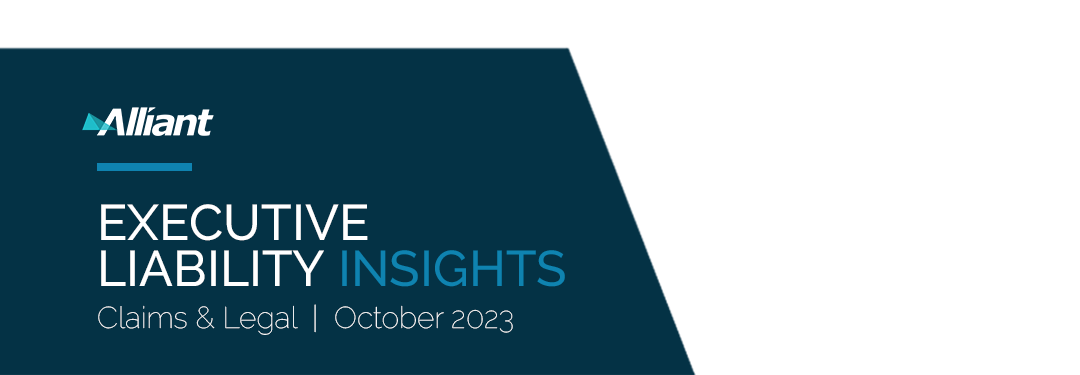
Navigating today’s complex risk environment can be a monumental task. Steve Shappell, Alliant Claims & Legal, spearheads Executive Liability Insights, a monthly review of news, legal developments and information on executive liability, cyber risk, employment practices liability, class action trends and more.


FEATURED ARTICLE
RECISSION OF E&O POLICY BASED ON MISREPRESENTATIONS IN AN APPLICATION
RLI Ins. Co. v. Outsidein Architecture, LLC, 20-cv-2395, 2023 U.S. Dist. LEXIS 160568 (M.D. Fla. Sep. 11, 2023).
Recently, an Insurer sought rescission based on misrepresentations in a professional liability policy’s application to avoid coverage for an architecture company (the “Company”) in a construction accident lawsuit. The Company contracted for the design and construction of a project, which included visiting the property during the construction phase, but did not require site inspections. The contract did not refer to demolition.
In This Issue:
RECISSION OF E&O POLICY BASED ON MISREPRESENTATIONS IN AN APPLICATION
RLI Ins. Co. v. Outsidein Architecture, LLC, 20-cv-2395, 2023 U.S. Dist. LEXIS 160568 (M.D. Fla. Sep. 11, 2023)
Recently, an Insurer sought recission based on misrepresentations in a professional liability policy’s application to avoid coverage for an architecture company (the “Company”) in a construction accident lawsuit. The Company contracted for the design and construction of a project, which included visiting the property during the construction phase, but did not require site inspections.
Read More >>
AN INSURANCE PROVIDER SUES ITS OWN INSURERS OVER THE UNDERWRITING EXCLUSION AND WINS ON THAT PORTION
Genworth Fin., Inc. v. AIG Specialty Ins. Co., 2023 Del. Super. LEXIS 777, 2023 WL 6160426 (Del. Super. Ct., Sep. 21, 2023).
In a recent decision, a state court refused to dismiss a professional liability coverage claim filed by a financial retirement and life insurance company (the “Company”) against nine of its professional liability insurers (the “Insurers”) for their refusal to cover three class-action settlements.
Read More >>
DELAWARE SUPREME COURT CONFIRMS THAT BROAD EXCLUSIONS IN D&O POLICY DO NOT PRECLUDE COVERAGE FOR FALSE CLAIMS ACT SETTLEMENT
ACE Am. Ins. Co. v. Guaranteed Rate, Inc., No. 360, 2022, 2023 Del. LEXIS 307 (Sep. 14, 2023).
The Delaware Supreme Court affirmed a Superior Court ruling in favor of the Insured on the issue of coverage for False Claims Act claims under a D&O policy. A mortgage company (the “Company”) received a civil investigative demand from the U.S. Attorney’s Office for the Northern District of New York and the U.S. Department of Justice, which alleged False Claims Act violations in relation to the Company’s underwriting and issuance of federally insured mortgage loans.
Read More >>
CALIFORNIA'S SECTION 533 USED TO BAR COVERAGE
United Talent Agency, LLC v. Markel Am. Ins. Co., 21-cv-00369, 2023 U.S. Dist. LEXIS 176042 (C.D. Cal. Sep. 29, 2023)
In a recent decision, a talent agency (the “Agency”) sought coverage for a lawsuit alleging intentional interference with contractual relations and inducing breach of contract, after the Insurer denied coverage based in part on a highly technical application of California Insurance Code Section 533. Under Section 533, an insurer is not liable for a loss caused by the willful act of an insured.
Read More >>
A MEANINGFUL BENCHMARK IS REQUIRED FOR PLAN PARTICIPANTS TO SURVIVE A MOTION TO DISMISS WITH BRINING AN ERISA VIOLATION
Matney v. Barrick Gold, No. 22-4045, 2023 WL 5731996 (10th Cir. Sept. 6, 2023).
The Tenth Circuit recently joined several other circuit courts’ holdings in ruling that a plan participant (the “Participant”) alleging excessive recordkeeping fees must assert a “meaningful benchmark” to survive a motion to dismiss. In the underlying case, the Participants formed a class action against its plan sponsor and plan fiduciaries, alleging that (1) the plan had investment options with unreasonably high fees, and (2) the plan’s recordkeeping fees were excessive.
Read More >>
COOPERATION AND CONSENT ARE PARAMOUNT TO RECEIVING COVERAGE
SE v. PF Holdings LLC, No. 22-12146, 2023 App. LEXIS 24909 (11th Cir. 2023).
Recently, the 11th Circuit Court of Appeals affirmed a district court’s opinion that the Insurer did not have to cover a significant arbitration award against certain Additional Insureds under the Policy.
Read More >>
INSURERS OWE COSTS REASONABLY RELATED TO DEFENSE
Lionbridge Techs., LLC v. Valley Forge Ins. Co., 20-cv-10014, 2023 U.S. Dist. LEXIS 163133 (D. Mass. Sep. 14, 2023).
In a recent decision, a technology company (the “Insured”) sought the full amount of defense costs from its insurer for defending an underlying trade secrets theft lawsuit, despite the existence of an uninsured co-defendant. The lawsuit alleged the companies joined a bidding process to access the seller’s trade secrets and use them to poach the seller’s clients.
Read More >>
CYBER CORNER
Click to read the following cases:
- NEW CYBERSECURITY RULES AFFECT CONTRACTORS DOING BUSINESS WITH THE FEDERAL GOVERNMENT
Read More >>
EMPLOYMENT CORNER
Click to read the following cases:
- EEOC RETURNING TO HEIGHTENED LEVEL OF LITIGATION ACTIVITY – REACHING ALL TIME HIGH IN SUIT FILINGS IN THE 2023 FISCAL YEAR
Read More >>
SECURITIES CORNER
Click to read the following cases:
- WHEN MAKING STATEMENTS ABOUT A COMPANY’S “DNA” COMPOSITION, ASSET MANAGERS RISK THE SEC-TESTING
- SEC EXPANDS THE NAMES RULE TO INCLUDE MORE INVESTMENT FUNDS TO AVOID FURTHER GREENWASHING
- SEC’S DIVISION OF EXAMINATION OUTLINES ITS PROCESS FOR SELECTING ADVISERS
- NEW AMENDMENTS FOR GOVERNING BENEFICIAL OWNERSHIP AIMED AT IMPROVING TRANSPARENCY FOR SHAREHOLDERS AND THE MARKET
- SEPTEMBER 2023 NOTEWORTHY ENFORCEMENT ACTIONS FILED
- SEPTEMBER 2023 NOTEWORTHY SETTLEMENTS AND JUDGEMENTS
Read More >>
SHAREHOLDER CORNER
Click to read the following cases:
- SEPTEMBER 2023 SECURITIES CLASS ACTION FILINGS
Read More >>
RECISSION OF E&O POLICY BASED ON MISREPRESENTATIONS IN AN APPLICATION
RLI Ins. Co. v. Outsidein Architecture, LLC, 20-cv-2395, 2023 U.S. Dist. LEXIS 160568 (M.D. Fla. Sep. 11, 2023).


Recently, an Insurer sought rescission based on misrepresentations in a professional liability policy’s application to avoid coverage for an architecture company (the “Company”) in a construction accident lawsuit. The Company contracted for the design and construction of a project, which included visiting the property during the construction phase, but did not require site inspections. The contract did not refer to demolition. A separate demolition contract listed the Company as the architect and again required site visits; however, the Company was not otherwise responsible for demolition. During demolition, a worker fell to his death, which the Company did not notice to their Insurer. After the Insurer refused to renew the Company’s policy, an application was submitted to other carriers stating there were no circumstances that may result in a claim being made and no history of any claims. Approximately six months after accepting a policy with a new Insurer, the Company was served with a lawsuit related to the underlying construction accident.
The new Insurer argued the Related Claims provision, the Prior Notice exclusion, and the Prior Knowledge provision each barred coverage for the suit. The court concluded that a strict reading of the policy did not preclude coverage because the letter the Company had received and reported to its prior Insurer was before the accident. That letter contained vague allegations of unethical practices surrounding the demolition was for breach of contract and, therefore, was not a related claim and could not trigger the prior notice exclusion. Additionally, the Prior Knowledge provision did not bar coverage because the Company was not aware that it had committed a wrongful act in connection to the demolition or worker’s death.
However, the court found that the Company made material misrepresentations on the application that voided the policy under the rescission doctrine. The court found that regardless of whether the misrepresentation was intentional, subjective intent does not overcome the fact that there was an objective basis to believe there was a possibility of a claim against the Company. Accordingly, there was no duty to defend or indemnify the Company in the underlying lawsuit.
AN INSURANCE PROVIDER SUES ITS OWN INSURERS OVER THE UNDERWRITING EXCLUSION AND WINS ON THAT PORTION
Genworth Fin., Inc. v. AIG Specialty Ins. Co., 2023 Del. Super. LEXIS 777, 2023 WL 6160426 (Del. Super. Ct., Sep. 21, 2023).
In a recent decision, a state court refused to dismiss a professional liability coverage claim filed by a financial retirement and life insurance company (the “Company”) against nine of its professional liability insurers (the “Insurers”) for their refusal to cover three class-action settlements. The Insurers based their coverage denials on three policy exclusions: a claims reserve, an underwriting, and a premium exclusion.


The Underwriting Exclusion barred coverage for “that portion of Loss” for any Claim against the Insured “based upon, arising out of or attributable to the underwriting of insurance, including any decisions involving the renewal of risks as well as the rates and premiums charged to insure or reinsure risks.” Notably, the exclusion also contains a carveback which provides that: “Notwithstanding the foregoing, this exclusion shall not apply to Claims arising out of the sale and marketing of insurance or investment products.”
The Insurers argued that the underwriting exclusion barred coverage because the underlying suits stemmed from the Company’s decisions regarding rates, premiums, and the Company’s failure to disclose significant premium increases. In opposition, the Company countered that the underwriting exclusion did not preclude coverage because the underlying class actions involved claims related to the sale and marketing of the Company’s policies. According to the Company, the underlying suits were brought on the sole basis of alleged misrepresentation and false marketing practices, as well as incomplete information concerning premium increases. Most notably, the Company argued that the class-action suits never alleged any wrongdoing by the Company’s underwriting practices, nor did they expressly challenge the Company’s ability to raise premiums.
The state court agreed with the Company, holding that a plain reading of the underwriting exclusion does not preclude coverage. The court pointed to the language in the exclusion which explicitly stated that the exclusion did not bar coverage for claims arising out of the sale and marketing of insurance or investment products. The court noted that the allegations in the underlying suits could be attributed only to the sale and marketing of the insurance products. For such practices, according to the court, the exclusion expressly preserved coverage. As such, the Underwriting Exclusion did not bar coverage.
Notably, the court also found that the claims reserve exclusion did not preclude coverage because “mere allegations or background facts tangentially relating to [the Company’s] Claim reserves [were] insufficient” to trigger it.” Yet, the court found the applicability of the premium exclusion to be an issue of fact.
DELAWARE SUPREME COURT CONFIRMS THAT BROAD EXCLUSIONS IN D&O POLICY DO NOT PRECLUDE COVERAGE FOR FALSE CLAIMS ACT SETTLEMENT
ACE Am. Ins. Co. v. Guaranteed Rate, Inc., No. 360, 2022, 2023 Del. LEXIS 307 (Sep. 14, 2023).
The Delaware Supreme Court affirmed a Superior Court ruling in favor of the Insured on the issue of coverage for False Claims Act claims under a D&O policy. A mortgage company (the “Company”) received a civil investigative demand from the U.S. Attorney’s Office for the Northern District of New York and the U.S. Department of Justice, which alleged False Claims Act violations in relation to the Company’s underwriting and issuance of federally insured mortgage loans. The Company ultimately settled the matter and sought coverage for the settlement under both its D&O and its professional liability policies.


The professional liability policy denied coverage citing an exclusion specific to False Claims Act matters and was not in dispute in this appeal. The D&O policy denied coverage for the settlement, arguing that the professional services exclusion and breach of contract exclusion barred coverage. The professional services exclusion precluded coverage for claims “alleging, based upon, arising out of, or attributable to any Insured's rendering or failure to render professional services.” At issue in the appeal was whether the “professional services” exclusion applied to bar coverage, and whether the Insurer acted in bad faith.
The Insurer argued that there was no coverage under the D&O policy because the claim “arose out of” the insured’s professional services provided to borrowers. The Company, in turn, argued (and the court agreed) that the FCA claims did not relate to professional services provided to borrowers, but to charges that it had defrauded the government by falsely certifying loans under FHA and VA requirements. Notably, the court cited a prior decision where the same insurance carrier successfully argued that FCA claims did not constitute professional services in denying a claim under a professional liability policy. The court further noted that professional services was an undefined term in the D&O policy and was thus open to the court’s interpretation.
The court held that the professional services exclusion was inapplicable to the FCA claims, and that summary judgment had properly been entered in favor of the Company by lower courts. The court further held that the insurer had a reasonable (although flawed) justification to initially deny the claim, and that a finding of bad faith against the insurer was unsupported.
CALIFORNIA’S SECTION 533 USED TO BAR COVERAGE
United Talent Agency, LLC v. Markel Am. Ins. Co., 21-cv-00369, 2023 U.S. Dist. LEXIS 176042 (C.D. Cal. Sep. 29, 2023).
In a recent decision, a talent agency (the “Agency”) sought coverage for a lawsuit alleging intentional interference with contractual relations and inducing breach of contract, after the Insurer denied coverage based in part on a highly technical application of California Insurance Code Section 533. Under Section 533, an insurer is not liable for a loss caused by the willful act of an insured.


In this context, “willful” means an act deliberately done for the express purpose of causing damage, intentionally performed with knowledge that damage is highly probable or substantially certain to result, or an intentional and wrongful act in which the harm is inherent in the act itself. The Ninth Circuit had previously ruled that Section 533 did not require a final adjudication of intentional conduct before application. Section 533 precludes only indemnification of willful conduct and not the defense of an action in which such conduct is alleged. The court determined that the management liability insurance policy’s duty to advance costs, as opposed to a duty to defend, was akin to a duty to provide indemnification and therefore if the allegations in the underlying suit involve a willful act, then Section 533 would bar coverage.
Under Section 533, one way an insurer can show allegations necessarily involve a willful act is to demonstrate that liability requires proof the defendant acted in a manner that would satisfy the definition of "willful" under Section 533. Ultimately, the court determined liability for each of the underlying causes of action necessarily requires proof of "willful" conduct and therefore coverage is barred by Section 533.
A MEANINGFUL BENCHMARK IS REQUIRED FOR PLAN PARTICIPANTS TO SURVIVE A MOTION TO DISMISS WITH BRINGING AN ERISA VIOLATION
Matney v. Barrick Gold, No. 22-4045, 2023 WL 5731996 (10th Cir. Sept. 6, 2023).
The Tenth Circuit recently joined several other circuit courts’ holdings in ruling that a plan participant (the “Participant”) alleging excessive recordkeeping fees must assert a “meaningful benchmark” to survive a motion to dismiss. In the underlying case, the Participants formed a class action against its plan sponsor and plan fiduciaries, alleging that (1) the plan had investment options with unreasonably high fees, and (2) the plan’s recordkeeping fees were excessive.


The court disagreed with the Participants’ allegations that the plan unwisely offered high-cost share classes of mutual funds when cheaper, but otherwise identical, share classes were available. To show that the plan’s fees were unreasonably high, the Participants relied on price comparisons between the plan’s investments, other funds, and a study that compiled data showing median expense ratios for various investment categories. However, the court looked at several documents incorporated in the complaint that established that the revenue share was rebated to the Participants, thus the net fee of the plan’s options was lower. Furthermore, the court rejected the Participants’ attempt to compare the challenged investments to other mutual funds because the complaint did not support their comparisons with well-pleaded facts. Lastly, the court rejected the Participants’ reliance on the study because median expense ratios, without more, did not provide meaningful benchmarks since they did not provide specifics on how a fund operated.
Next, the Participants alleged that the plan sponsors breached their fiduciary duties under ERISA by failing to regularly issue requests for proposal. Instead, the Participants alleged that the plan sponsors relied heavily on the “401k Averages Book,” which showed that other retirement plans paid substantially less for recordkeeping services. In response, the court noted that there was no requirement for fiduciaries to obtain competitive bids for services at any regular interval. To the contrary, the court cited evidence that the plan fiduciaries periodically negotiated with the recordkeeper to obtain lower fees which, over time, resulted in the decline of recordkeeping fees.
Ultimately, the court held that to raise a plausible inference of imprudence of excessive management and recordkeeping fees, the Participants must allege meaningful benchmarks—now, a well-established standard.
COOPERATION AND CONSENT ARE PARAMOUNT TO RECEIVING COVERAGE
SE v. PF Holdings LLC, No. 22-12146, 2023 App. LEXIS 24909 (11th Cir. 2023).
Recently, the 11th Circuit Court of Appeals affirmed a district court’s opinion that the Insurer did not have to cover a significant arbitration award against certain Additional Insureds under the Policy.


In the underlying tort action, two residents (the “Residents”) of an apartment complex sued the management companies that owned, ran, managed, and controlled the complex alleging poor living conditions that persisted for years. The Residents sent pre-suit settlement demands to the management companies, who tendered the Claim to the Insurer as Additional Insureds. The Insurer rejected the demands and state court litigation ensued.
The Insurer accepted the Claim but did not immediately consent to the management companies’ use of separate counsel. During this slight delay, the management companies continued their defense of the case using “unapproved,” separate, counsel as opposed to simply joining the defense being provided by the Insurer’s appointed counsel.
The Residents agreed to dismiss their claims against the Named Insured entity but proceeded to arbitrate their claims against the management companies (the Additional Insureds). The management companies continued to be defended by the still “unapproved” separate counsel.
The Insurer filed a declaratory judgment action against the management companies before the arbitration hearing occurred and argued there was no coverage due to a failure to cooperate. The management companies countered that the insurer acted in bad faith since the insurer delayed responding to the request for counsel and further, that the insurer failed to accept the pre-arbitration settlement demands.
The arbitrator ultimately found in favor of the Residents and issued a significant award against the management companies. The Insurer refused to pay the award and continued litigating the failure to cooperate coverage case. The Insurer argued there was a breach of the duty of cooperation when the management companies proceeded with arbitration without the Insurer’s consent, hired their own counsel, and failed to provide notice or seek approval from the Insurer before consenting to the confirmation of the arbitration award.
The Additional Insureds argued they were excused from cooperating because they believed the Insurer acted in bad faith and they believed the insurer denied them a defense. However, the court found that the conduct of the management companies during the arbitration proceeding demonstrated a lack of cooperation and such lack of cooperation prejudiced the Insurer. The court detailed that the Insurer was prejudiced because it was forced to accept arbitration with its appointed counsel relegated to the sidelines and lost its opportunity to object to the arbitration award before it was confirmed.
INSURERS OWE COSTS REASONABLY RELATED TO DEFENSE
Lionbridge Techs., LLC v. Valley Forge Ins. Co., 20-cv-10014, 2023 U.S. Dist. LEXIS 163133 (D. Mass. Sep. 14, 2023).
In a recent decision, a technology company (the “Insured”) sought the full amount of defense costs from its insurer for defending an underlying trade secrets theft lawsuit, despite the existence of an uninsured co-defendant. The lawsuit alleged the companies joined a bidding process to access the seller’s trade secrets and use them to poach the seller’s clients.


The insurer refused to cover the full amount of defense costs because allegations of fraud and breach of a confidentiality agreement were made solely against the uninsured co-defendant. The Insured argued that regardless of whether a co-defendant benefited, the insurer was required to provide a complete defense.
The court determined, in accordance with well-settled principles, that the insurer’s duty to defend included all costs reasonably related to its Insured’s defense; however, the court went on to state that a reasonable allocation between the Insured and non-insured companies applied. According to the court, a reasonable allocation is what the companies would have negotiated had each paid its own fees from the start. This reasonableness determination must consider a variety of factors, including “relative exposure of the parties liability, the size of the parties, and the parties most benefiting from the joint defense work.” The court further noted that the insurer could seek contributions from the uninsured co-defendant, but that did not affect the ability to allocate costs. This decision, applying Massachusetts law, initially reinforces that insurers owe all the costs reasonably related to their insured’s defense, but takes a troubling detour to discuss the relative exposures of the parties. This a potentially dangerous and inconsistent path away from the otherwise well-established standard for determining defense costs owed by insurers.
Cyber Corner
NEW CYBERSECURITY RULES AFFECT CONTRACTORS DOING BUSINESS WITH FEDERAL GOVERNMENT
Following an executive order to standardize contractual requirements for cybersecurity across federal agencies, the Department of Defense, the General Services Administration, and NASA have proposed revisions to federal regulations governing procurement.
Employment Corner
EEOC RETURNING TO HEIGHTENED LEVEL OF LITIGATION ACTIVITY – REACHING ALL TIME HIGH IN SUIT FILINGS IN THE 2023 FISCAL YEAR
Recently, the Equal Employment Opportunity Commission (“EEOC”) wrapped up its 2023 Fiscal Year (“FY 2023”) with a total of one-hundred and forty-four EEOC merit lawsuits, which was a five-year high. This spike comes after a significant downturn of filings throughout the COVID-19 pandemic, where the EEOC only saw about one hundred lawsuits each year from 2020 to 2022.
Securities Corner
WHEN MAKING STATEMENTS ABOUT A COMPANY’S “DNA” COMPOSITION, ASSET MANAGERS RISK THE SEC-TESTING
One of Europe’s largest asset manager firms (the “Company”) attracted the U.S. Securities and Exchange Commission’s (the “SEC”) magnifying glass, when one of its former sustainability leaders was dismissed for reportedly blowing the whistle on the company’s inflated sustainability claims.
SEC EXPANDS THE NAMES RULE TO INCLUDE MORE INVESTMENT FUNDS TO AVOID FURTHER GREENWASHING
Recently, the SEC adopted new amendments to the two-decade-old regulation known as the “Names Rule,” which will bring more investment funds under the regulation of the SEC. The purpose of the Names Rule is to ensure that registered funds do not use names that are deceptive or inconsistent with their investments.
SEC’S DIVISION OF EXAMINATION OUTLINES ITS PROCESS FOR SELECTING ADVISERS
The SEC recently issued a risk alert, which outlined the factors the SEC will take into consideration when selecting registered investment advisers (“Advisers”) to examine. These examinations are a part of the SEC’s risk-based approach that is meant to adapt to market changes, industry practices, and investor preferences.
NEW AMENDMENTS FOR GOVERNING BENEFICIAL OWNERSHIP AIMED AT IMPROVING TRANSPARENCY FOR SHAREHOLDERS AND THE MARKET
Recently, the SEC adopted several amendments that govern beneficial ownership reporting. The purpose of the new rules was to shorten the deadlines for Schedule 13D and Schedule 13G filings from 10 business days to 5 business days, clarify the disclosure and beneficial ownership requirements as they relate to derivative securities, and provide some direction on “group” formation.
|
Director/Officer |
Role |
Company |
|
Guosheng Qi |
CEO |
Gridsum Holding, Inc. |
|
Mina Tadrus |
Founder |
Tadrus Capital LLC |
|
Dharma Teja Nukarapu |
Founder / CEO |
SharkDreams, Inc. |
|
Nima Golsharifi |
CEO |
NDB, Inc. |
|
Donal R. Schmidt, Jr. |
CEO |
Rapid Therapeutic Science Laboratories, Inc. |
|
Chauncey Forbush Lufkin III |
CCO |
Lufkin Advisors, LLC |
|
Michael Caridi |
Director |
Tree of Knowledge International Group |
|
Director/Officer |
Role |
Company |
|
Guosheng Qi |
CEO |
Gridsum Holding, Inc. |
|
Mina Tadrus |
Founder |
Tadrus Capital LLC |
|
Dharma Teja Nukarapu |
Founder/CEO |
SharkDreams, Inc. |
|
Nima Golsharifi |
CEO |
NDB, Inc. |
|
Donal R. Schmidt, Jr. |
CEO |
Rapid Therapeutic Science Laboratories, Inc. |
|
Chauncey Forbush Lufkin III |
CCO |
Lufkin Advisors, LLC |
|
Michael Caridi |
Director |
Tree of Knowledge International Corp. |
SEPTEMBER 2023 NOTEWORTHY SETTLEMENTS AND JUDGMENTS
|
Amount |
Director/Officer |
Role |
Company |
|
$15,802,376 |
Seong Yeol Lee |
CEO |
Ameritrust |
|
$846,551 |
Michelle Silverstein |
Officer |
Esos Rings, Inc. |
|
$1,922,621 |
Douglas MacWright |
CEO |
Highlander Capital Management, LLC |
|
$25,300,000 |
Craig M. Knight |
CEO |
Hyzon Motors Inc. |
|
Amount |
Director/Officer |
Role |
Company |
|
$ 15,802,376 |
Seong Yeol Lee |
CEO |
Ameritrust |
|
$846,551 |
Michelle Silverstein |
Officer |
Esos Rings, Inc. |
|
$1,922,621 |
Douglas MacWright |
CEO |
Highlander Capital Management, LLC |
|
$25,300,000 |
Craig M. Knight |
CEO |
Hyzon Motors Inc. |
Source: U.S. Securities and Exchange Commission
https://www.sec.gov/litigation/admin.htm
Source: Stanford Law School Securities Class Action Clearinghouse
ABOUT ALLIANT INSURANCE SERVICES
Alliant Insurance Services is the nation’s leading specialty broker. In the face of increasing complexity, our approach is simple: hire the best people and invest extensively in the industries and clients we serve. We operate through national platforms to all specialties. We draw upon our resources from across the country, regardless of where the resource is located.
Contributors


Abbe Darr, Esq.
Claims Attorney
abbe.darr@alliant.com
David Finz, Esq.
Claims Attorney
david.finz@alliant.com
Isabel Arustamyan
Claims Advocate
isabel.arustamyan@alliant.com
Jacqueline Vinar, Esq.
Claims Attorney
jacqueline.vinar@alliant.com
Jaimi Berliner, Esq.
Claims Attorney
jaimi.berliner@alliant.com
Karina Montoya, J.D.
Claims Advocate
karina.montoya@alliant.com
Malia Shappell, Esq.
Claims Attorney
malia.shappell@alliant.com
Michael Radak, Esq.
Claims Attorney
michael.radak@alliant.com
Peter Kelly, Esq.
Claims Attorney
peter.kelly@alliant.com
Robert Aratingi
Senior Claims Advocate
robert.aratingi@alliant.com
Steve Levine, Esq.
Claims Attorney
slevine@alliant.com